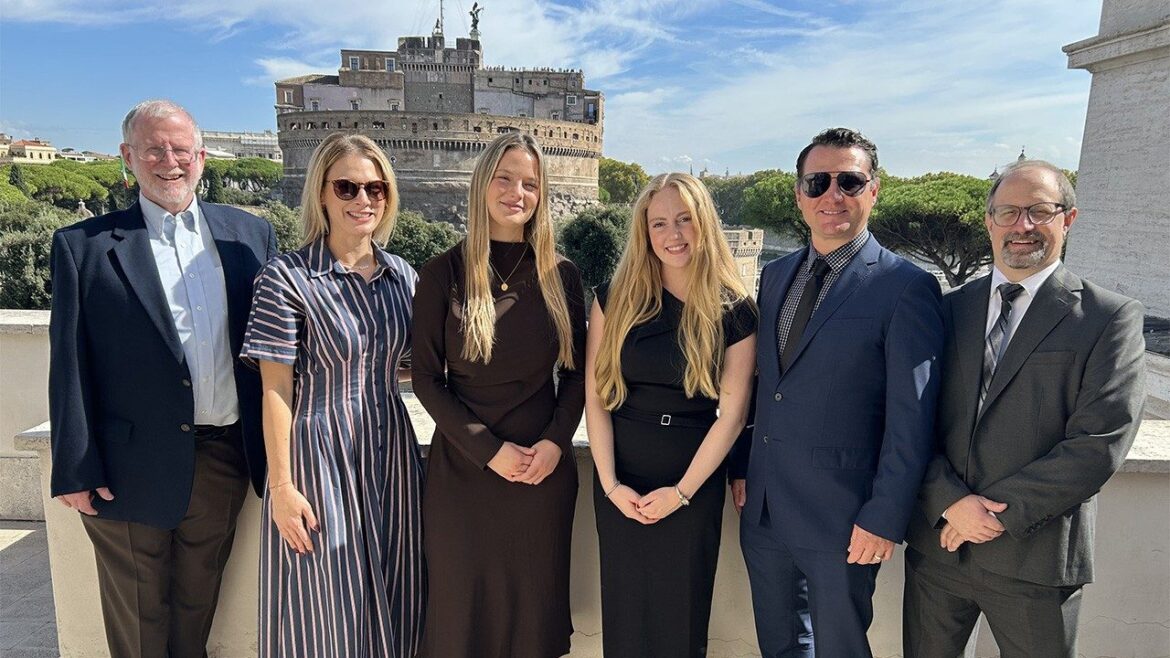
Pope Leo welcomes a group of students and faculty from Villanova University in the United States where he received his Bachelor of Science degree in Mathematics in 1977.
By Thaddeus Jones
On Friday 10 October Pope Leo XIV met in a private audience with a group of 19 students and faculty Villanova University, just outside Philadelphia in the United States. The University is Pope Leo’s alma mater where he received a Bachelor of Science degree in Mathematics in 1977.
Professors Daniel Joyce, Chair of the Department of Computing Sciences, together with his colleague Dr. Frank Klassner of the same Department and Dr. Tom Ksiazek, Chair of the Communication Department, led the Villanova group consisting of students studying in Rome for the semester.
Dr. Joyce recounted how he arrived in the mathematics department, as it was previously known, the same year the Pope graduated. Regarding the study of mathematics, he explained how this background is particularly helpful in understanding and studying the technical realities of today, especially in the field of artificial intellience, or AI.
Professor Klassner said the Pope’s mathematical background “gives him an advantage in facing the challenges that technology is presenting these days” since it underlies so much of the technology we are using, such as AI and computer security systems. And this knowledge can help him in better analyzing the ethical problems in these areas, while also approaching the questions from other disciplines such as metaphysics, ethics, philosphy, and theology to gain a wider understanding of complex realities and desired outcomes that respect the dignity of the human person.
Both academics also appreciated Pope Leo XIV taking the name “Leo” in memory of his predecessor Pope Leo XIII who grappled with the immense challenges of the Industrial Revolution, while today we face similar epocal change with the rise and implementation of AI. Dr. Joyce acknowledged “we have to learn how to deal with the side effects of new technology and the effects on the population, the effects on the economy” and how if we move too quickly without thinking through these areas we may later regret it, as we are seeing with the challenges presented now with generative machine learning.
Among the Villanova students present for the papal audience were Morgan Ballista and Sophie Casio, both communication majors in their third year of study on a study program in Rome with internships at the UN’s International Fund for Agricultural Development (IFAD). They expressed their joy in meeting Pope Leo, also as an alumnus, recalling how the church bells rang out for hours on the home campus following the announcement of his election. Accompanying them, Professor Ksiazek expressed his gratitude for the Pope taking time to greet them, underscoring the importance of building bridges in our fractured world and building on the Augustinian commitment to the ideals of truth, unity and love.
Villanova University is an Augustinian Catholic community of higher education founded and sponsored by the Order of St. Augustine to which Pope Leo belongs. As the University states, “inspired by the life and teaching of Jesus Christ, the University seeks to advance a deeper understanding of the relationship between faith and reason—preparing students to think critically, act compassionately, and succeed while serving others.”

